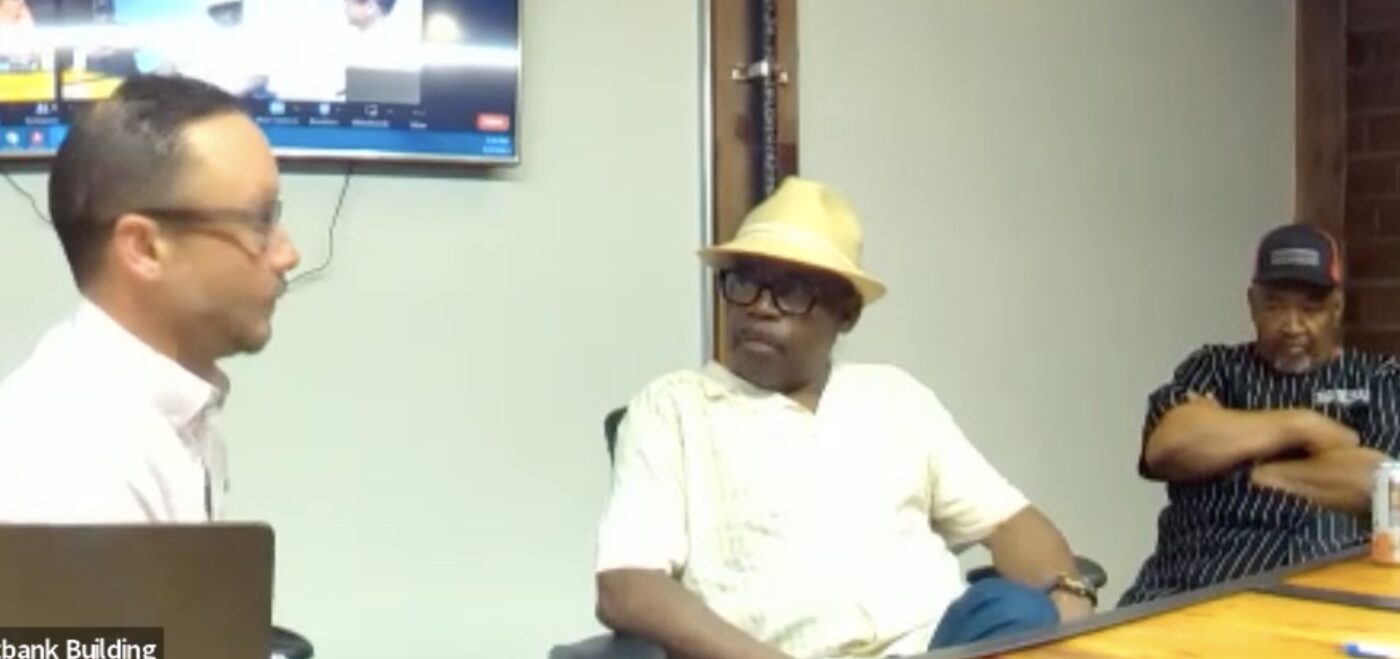
A member of the Oregon Department of Transportation’s executive team was overcome with emotion and had to walk out of a meeting Tuesday night after he broke the news of a major funding shortfall and construction delay for the I-5 Rose Quarter project.
Since ODOT convened the Historic Albina Advisory Board in September 2020, they’ve built up expectations with Black residents of north Portland who make up the group that the “generational project” would lead to hundreds of well-paying jobs and multi-million dollar construction contracts for Black-owned firms. But a recent reckoning with financial reality spurred on by years of choices that favored expensive freeway expansion megaprojects, combined with a pause on tolling by Governor Tina Kotek has thrown a wrench into ODOT’s plans.
The rubber hit the road at Tuesday’s meeting of the HAAB where Finn had to share the bad news.
ODOT has spent $115 million on the Rose Quarter project thus far, despite not breaking any ground. They hoped to begin construction of the project later this year, but tolling was always a central component of paying for this project (and several other regional freeway projects that are part of their Urban Mobility Strategy). Without that source of revenue, ODOT’s house of cards has come tumbling down and they don’t have money to move forward.
At the HAAB meeting last night ODOT told members of the committee that they likely will not begin any construction until early 2025 — and that’s only if major new funding becomes available. With the estimated cost ballooning to $1.5 to $1.9 billion, ODOT will have to pull down a major federal grant if no other state revenue comes around.
This decision came only after Kotek paused the collection of tolls until 2026 and then required ODOT to come up with a financial plan for these projects using the funding they have in the bank right now. “We face the need to manage our spending more conservatively,” read an ODOT statement about the financing plan.
Brendan Finn is manager of ODOT’s Urban Mobility Office that oversees the I-5 Rose Quarter and other projects in the Urban Mobility Strategy. At the HAAB meeting last night he broke the news that ODOT will invest just $44 million more dollars into the project — enough to complete the designs and bring them to a point that makes the project competitive for major federal grants. But that won’t be enough to start construction and the flow of jobs that would come with it.
HAAB members felt blindsided by the news and their anger was palpable.


“This is all news to me. I’ve been fighting for this project for about four years now, and all of a sudden we get up to this point and the funding is in jeopardy?” said HAAB member James Posey, a co-founder of the National Association of Minority Contractors of Oregon. “I’m confused because I thought the governor had worked out a deal.” (Posey was referring to the deal former Governor Kate Brown made in August 2021 to endorse a project that included large highway lids that could aid in the redevelopment of Albina.)
“I’m disappointed that the slowdown order was issued in such a way that it would impact this project,” added another HAAB member, former Portland Police Officer Kevin Modica. Here’s more from Modica:
“If you’re listening from the governor’s office, this is not fair. We have an expectation to see you at this table. Don’t send spoiled fruit as the meal is served by someone that you can hide behind. This is not right. This is not okay. We have prime contractors that are building their business and forecasting — and now it’s another 24 months off. It’s not okay.
Governor Kotek, this is a huge disappointment. Huge.”
Several HAAB members made it clear they were not mad at Finn (“This isn’t about you,” they repeated), but wanted more accountability from Governor Kotek. They also expressed that it was unfair that white politicians from Clackamas County were able to win a pause on tolling and that freeways projects in places like Wilsonville will still move forward. “This sounds like to me, big politics,” one HAAB member commented. “It’s interesting to me how some people cry and they get heard and a process gets paused for two years, and other communities cry and get heard and the process continues.”
Even though they made it clear they weren’t directing their comments toward Finn, he still took it personally. “I know you said it’s not personal, but I take it personally that I did come to many of you and we said we wanted to establish trust,” he said.


“We need to keep this [project] going,” Finn said at one point, trying muster optimism. “This can’t be what happened to the Columbia River Crossing [a project that failed in 2013, only to be resurrected as the Interstate Bridge Replacement Program]. This project is generational. And we can’t stop the momentum. It would be easy, I think for some to say, ‘You don’t have the funding for construction.’ But neither did Interstate Bridge three years ago. So there’s some strategy to be had. There’s some voices to be heard. So we can get there.”
HAAB member John Washington wants to be one of those voices to be heard. He encouraged people on the committee to not let the decision stand. “The question I have is, what’s the muscle in this room as a response to us being pushed around? Because for far too long we’ve been passive recipients of this kind of stuff. You brought us a dream and a vision, now there’s another vision to be deferred in our lifetime? I got some issues with that part of it.”
Then Washington appealed directly to Finn. “It’s time to grow a set, B[rendan]. It’s time to step up to the plate. If you want to displace all these relationships you helped develop?… If I were you I’d go into that office with your staff and your director and tell them what you’ve established right here and somehow gain some kind of opening for us to navigate through the rest of the way.”
Finn has spent years building trust and friendships with the people in that room Tuesday night. They clearly see him as an ally and conduit to state influence. Given that, it’s easy to see how heavy the weight of this bad news was on Finn’s shoulders.
Toward the end of the meeting, Modica asked Finn if he was ready to carry the message from this group to the OTC at a special meeting on the financing plan that was held yesterday.
“I think where I want to start with them [the OTC] is… just… well… I need to gather my thoughts right now, I’m actually kind of emotional,” Finn said as he removed his glasses and wiped his eyes. “And I apologize,” he continued. And then Finn got up and walked away as HAAB members looked on and his empty chair swiveled on the video screen. (Watch the clip below.)
At their meeting Wednesday, the OTC voted to adopt ODOT’s updated financing plan. That plan includes the $44 million in design work for the Rose Quarter and an indefinite postponement of the second phase of a planned I-205 freeway expansion.



